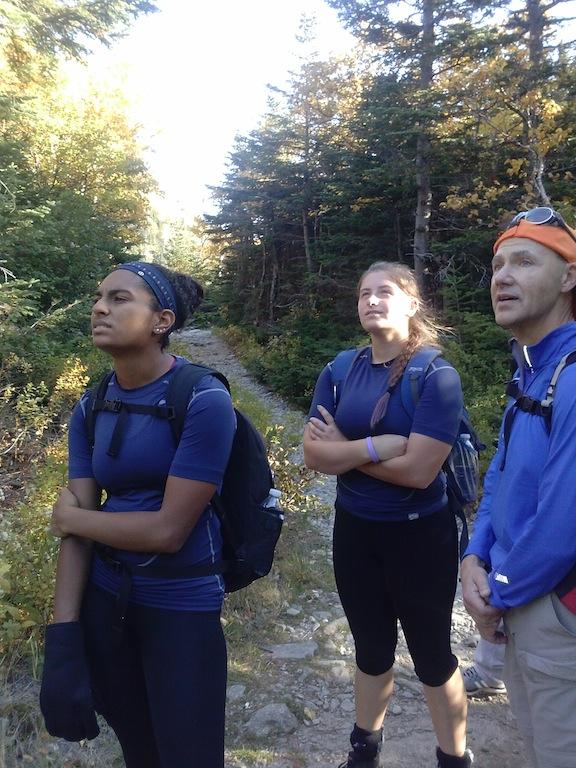Mercy Takes Washington
Business students tackle the Adirondacks
In New Hampshire, surrounded by the White Mountain National Forest, lies the highest peak in the Northeastern United States. It is a monster of a mountain, known for its erratic weather. For 76 years, until 2010, a weather observatory located on the summit held the record for the highest wind gusts directly measured at the earth’s surface – 231 miles per hour – on the afternoon of April 12, 1934.
In September, the upper classmen of the Mercy College Business Honors Program made the lengthy trip to New Hampshire with one goal in mind – to conquer it. The plan was to climb to the top, celebrate, and then scale back down, together as a group.
The climb, coordinated by Mercy’s “Professor of the Year” Charles Garcia, was described to students as a real challenge.
“We climbed Marcy, but Washington is a bigger, badder mountain,” said Garcia, in an informative meeting held for students attending the climb. Although they encouraged everyone to attempt the trek, they made it clear that it would be no walk in the park. When they reached the base of the mountain, the business honors students realized quickly that they got more than what they bargained for.
So what’s the deal with the mountain climbing?
Mercy College’s emerging School of Business has changed its philosophy over the past three years, taking a hands-on approach to learning. The faculty strongly believes that in order for students to become successful business people, they need to be able to apply theory to practice. Book learning can only take you so far; the Mercy College School of Business knows this all too well, and has made it a mission to be a different program, transforming students into leaders and preparing them with the right tools to be successful in the future.
“Learning by doing’ is what we are all about,” Garcia says.
As freshmen, students who partake in the entry level management course are encouraged to travel with the school to climb Mt. Marcy as part of their curriculum. Part of the Adirondacks, Mt. Marcy is the highest peak in New York, coming in at approximately 5,400 feet.
This year, they added another mountain to the list. Mt. Washington was offered to upper classmen and some freshmen who were unable to climb Mount Marcy for other reasons.
The idea behind the mountain climbing is simple. The mountain is a metaphor for life. Like life, one is eager to begin the climb because the goal of reaching the top is so appealing. Like most individuals, one only pictures the beginning and the end; the middle is completely left out. What people don’t realize is that the middle, which is symbolic of everything in between, is the hardest part, and often the most meaningful in terms of growth. It isn’t the obstacles that push one down, but how one recovers from those obstacles is that determines the type of person one will become.
Garcia, an experienced mountain climber and esteemed member of the business elite, also emphasizes to students how important it is to have a good team behind them.
“No matter how you put it, you will never make it entirely alone. Having a strong team of people whom you trust is key,” says Garcia to all of the students who are in his management course. This piece of advice for mountain climbing proves to be true when it comes to how one lives his or her life as well.
Every influential person has run into people who have changed their lives for better or for worse. Those who have made an impact their lives in a positive way are the reasons why they keep going, and those who have impacted them negatively are the motivation behind their success. They keep going to prove that they are better than their critics said they are.
“It was one of the hardest things that I have ever had to do, but it was one of the best weekends of my life,” said junior Amanda Droll.
Mt. Washington has quite a steep incline and a very impressive boulder field that can be extremely straining on the body for novice climbers. Some students found the altitude to be one of the hardest things to adapt to, reporting that many of them felt dizzy and short of breath. One student even vomited. However, altitude sickness and nausea were not enough to keep the Business Honors from conquering the mountain. Although the physicality of the trek proved to be difficult, many students said that the mental aspect was the most difficult part.
“Physically, I had no problem, but it broke me mentally. When I got to the top it was the most incredible feeling in the world,” explained Droll.
Andrew Boryk, a sophomore who participated in the climb to the summit of Washington, had climbed Mount Marcy the previous year. “I climbed Marcy last year; it felt like a long hike. This was entirely different; it was so much steeper. We were on our hands and knees and there was blood and tears. It’s that thing where you can see the peak the whole time, but we could never get there unless we kept going.”
Droll understood why the school of business made mountain climbing a part of their curriculum and was happy to see how it had made the translation to her life. “To me, it was stepping out of my comfort zone: doing something that you have never done before, taking a risk and not stopping no matter how hard it gets.”
In fact, Droll was not the only person who saw the correlation between business in the mountain.
Boryk put it finely: “Business is the new mountain. All my life I have always done things that I enjoyed; I felt as if I were starting a new chapter of my life. I may not like the whole trek, but as long as I get through the obstacles and keep the end goal in mind, I will eventually get there.”
This is the idea that the School of Business aims to instill in the minds of their students. Life is hard, business is hard, but if one keeps a clear mission in mind and has a strong team for support, committed to driving that mission to completion, then anyone can come out on top.
The art of reciprocity is another principle which Garcia and The School of Business aim to instill in their students through mountain climbing.
“If you want to be successful, help someone else become successful.”
After climbing Washington, many of the students realized just how important this ideal is.
“I kept saying I can’t anymore,” said Droll about her experience, “but I had my team and my friends around me pushing me ahead.”

Tiffany is a Marketing Major and a Journalism minor at Mercy. She has been a ballet student for many years. She loves any sport you can bet on. She hates...








